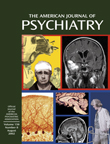Psychotic Recurrence After Antipsychotic Discontinuation
To the Editor: Michael Gitlin, M.D., et al. (1) made an extremely important contribution to our field by demonstrating that essentially all individuals who have a remission of a first episode of schizophrenia will have a recurrence if they discontinue antipsychotic medication. Despite this striking result, the authors did not suggest that this new finding should translate into a strong recommendation for long-term antipsychotic maintenance treatment. Why were the authors reluctant to make such a recommendation?
The authors acknowledged that the study was undertaken to evaluate a targeted medication approach in a group with recent-onset schizophrenia. While it is now clear that targeted medication approaches should not be generally recommended for patients who have had multiple episodes of illness (2), this study should raise similar concerns about its use in first-episode patients in remission. The fact that only 13% of the patients needed to be rehospitalized in the first 2 years of no medication is hardly reassuring. It is not the risk or cost of hospitalization that argues for continuous treatment, nor is it the hypothetical risk of psychosis-induced neurotoxicity. It is the need to spare individuals with schizophrenia and their families from the terrible suffering and disruption to their lives that all too frequently accompany such recurrences. Hospitalization is too crude a measure of outcome. Assessments of outcome need to take into account the degree to which patients are able to function, as well as their quality of life and risk of suicide in the long term.
Interpretation of the study by Dr. Gitlin et al. was also greatly limited by the absence of a control group assigned to continuous treatment. We do not know whether patients who discontinue their medications achieve the same degree of recovery in the long term as those who receive continuous medication. The authors gave the impression that if a recurrence is identified early, it can be easily treated and the person can be rapidly returned to his or her previous level of functioning. No data are provided to support this notion. To the contrary, current evidence suggests that each relapse from a remitted state may be associated with a substantial risk of incomplete remission and persisting disability (3).
Given this compelling new evidence of a 100% risk of recurrence and the absence of evidence that targeted treatment carries lower medical risks than continuous treatment, should we not give the majority of our first-episode patients in remission a clear recommendation to keep taking medication? That some may choose to do otherwise is understandable. We will at least have given them our best advice.
1. Gitlin M, Nuechterlein K, Subotnik KL, Ventura J, Mintz J, Fogelson DL, Bartzokis G, Aravagiri M: Clinical outcome following neuroleptic discontinuation in patients with remitted recent-onset schizophrenia. Am J Psychiatry 2001; 158:1835-1842Link, Google Scholar
2. Lehman AF, Steinwachs DM: Translating research into practice: the Schizophrenia Patient Outcomes Research Team (PORT) treatment recommendations. Schizophr Bull 1998; 24:1-10Crossref, Medline, Google Scholar
3. Wiersma D, Nienhuis FJ, Slooff CJ, Giel R: Natural course of schizophrenic disorders: a 15-year follow-up of a Dutch incidence cohort. Schizophr Bull 1998; 24:75-85Crossref, Medline, Google Scholar



